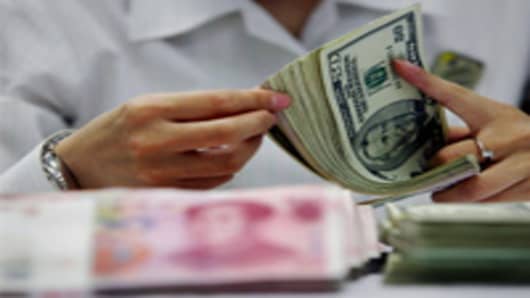Does anyone else, besides me, feel that the U.S. economy is like a car about to drive off a cliff while the drivers – the Congress – are arguing about which radio channel to listen to rather than trying to change the direction the car?
The past week I saw with dismay the American Senate rally to push a currency bill that if passed will allow America to slap tariffs on China and most certainly precipitate a trade war between the world’s two economic superpowers.
Even in good times trade wars result in job losses and create economic inefficiency but misguided actions like this now, when a debt crisis has gripped both Europe and the U.S., would be disastrous for everyone.
Risks of a trade war are rising as anger is bubbling up not only in Washington but also in Beijing where officials face huge domestic pressure to stand up and declare an end to American hegemony.
On Thursday October 6 President Obama lashed out, "China has been very aggressive in gaming the trading system to its advantage and to the disadvantage of other countries, particularly the United States.” He continued, "Currency manipulation is one example of it."
After hearing President Obama’s speech, one influential Chinese person told me angrily, “We have already appreciated the renminbi 8 percent in the last year, forcing the closure of many factories, yet America’s jobs growth remains anemic. America’s jobs problem has nothing to do with China’s currency rate but Congress’ irresponsible bickering, lack of a job recovery plan and inability to reign in Wall Street. Congress is causing more problems than solving (any).”
The anti-China rhetoric is one of the few issues that gain bi-partisan support in the Congress. America’s political leaders have tried to divert attention from their own inability to create a job creation plan by blaming another country’s exchange rate despite China playing a relatively responsible role in the past year.
China is simply no longer a cheap place to do business as the Congress argues. China has appreciated the currency causing its manufacturing sector to get hit with thousands of factory closures. Minimum wages across the board are rising and the country overall is dealing with massive inflation. The cost of doing business in China is already 10-15 percent higher year on year. Rising costs are another way to remedy an undervalued currency without changing the exchange rate.
The result of China’s currency and cost moves has done little to help America’s unemployment rate which hovers at 9.1 percent. A stronger yuan will not be some magic panacea for America. Jobs will not immediately, if ever, return to the U.S. As any businessman knows, it takes years not months to relocate manufacturing operations. It can take even longer for integrated supply chains, such as moving zipper manufacturers, button makers to follow jeans producers. Such total industry shifts take years.
The reality is China has the most efficient labor force and logistics infrastructure in place to handle mid to high end manufacturing, so it is unlikely to lose manufacturing dominance. Light industry has already been leaving the nation for years. Nike now makes more products in Vietnam than China. When costs soared in China, American manufacturers like Nike and Disneydid not return to the U.S. – they sought cheaper manufacturing locales.
The key to America’s economic recovery is building confidence back up by reducing debt and restructuring the economy for the nation to maintain its innovative edge and create jobs. The pain Americans feel is terrible but it is a natural evolution of economic systems and economic cycles. The way to stay ahead is to evolve and not by trying to put up tariffs and barriers to trade.
There are simply no easy solutions to America’s economic problems. The ab use by politicians, financial institutions and everyday Americans wanting to live well beyond their means went on for far too long. The worst thing America can do right now is enter into a trade war with China. My guess is there is a 90 percent chance China will signal its displeasure with Congress by signing more deals with European companies like Airbus over Boeing.
A rising China is not a zero sum game as so many seem to believe now. A strong China will create more jobs for Americans by creating a consumer class that wants to buy products from AppleStarbucks, and Ralph Lauren. My firm has interviewed large multinationals, many of which are getting 15 percent of their global revenue from China now. The majority responded they do not want the yuan to appreciate too much but as one president of a well-known consumer products’ company told me, “I cannot say that publicly because I am worried about the backlash from Congress and angry consumers.”
Shaun Rein is the founder and managing director of the China Market Research Group (www.cmrconsulting.com.cn) a strategic market intelligence firm, and is based in Shanghai.
He is the author of the upcoming book “The End of Cheap China: Economic and Cultural Trends that will Disrupt the World” published by John Wiley & Sons in the U.S. He does not own shares in any company mentioned. Follow him on Twitter at @shaunrein.


